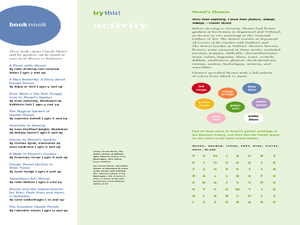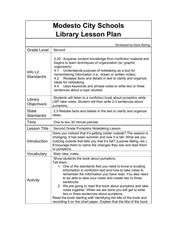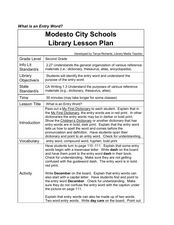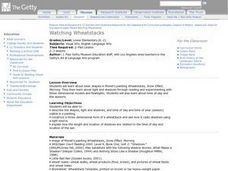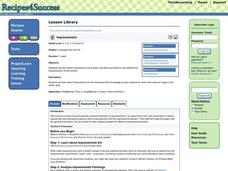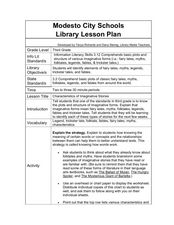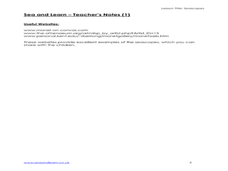Curated OER
Stewart's Boxes
Learners collect memorabilia and create shadow boxes in the style of David Stewart. They also compose a poem and explain their identity in an oral presentation. This is a rare lesson that works quite well for a variety of age levels.
Curated OER
Lesson Plans for Drawing
Students analyze Impressionist art and complete related activities. In this Impressionist art lesson plan, students read and study the art of Childe Hassam. Students explore basic design concepts and the steps in drawing. Students...
Curated OER
NGA Kids Inside Scoop Spring 2007
Young scholars become familiar with the work of Claude Monet and his garden paintings. For this Monet lesson, students compare the garden works of Claude Monet. Young scholars examine pictures for the colors in his paintings. Students...
Curated OER
Exploring Impressionist Landscapes
Learners visit an on-line art museum in Paris, analyze several landscapes, and explore the painting techniques. They become familiar with distinctive aspects of classical Impressionist landscape paintings.
Curated OER
Story Telling with Black & White Photography
4th-8th graders will explore Wright Morris' photography and create their own black and white photographs. They will then use the photographs to portray a message they want communicated by writing a narrative telling a story about the...
Curated OER
Painted Shoes
Students recreate great works of art on old shoes in this exciting art lesson for grades K-8. Emphasis is placed upon the work of Canadian artist Theodore Dragonieri and examples of paintings created by "the Masters" (including VanGogh,...
Curated OER
Son of a Gamblin' Man: The Life and Art of Robert Henri
Students bring baby pictures of themselves. They discuss composition in art and compare these to their pictures. Students discuss mood, and ways an artist creates mood. They create a triptych using their baby picture, a recent photograph...
Curated OER
Second Grade Pumpkins Note taking Lesson
Second graders read a book. In this note taking lesson, 2nd graders read a book about pumpkins and take notes together. Students write a summary about pumpkins using the information from their notes.
Curated OER
Dictionary Work - Entry Words
Second graders examine the use of entry words in the dictionary. In this dictionary use lesson, learners look at guide words in a children's dictionary as the teacher/librarian describes the characteristics of each entry. They complete...
Curated OER
Watching Wheatstacks
Students explore basic shapes in Monet's paintings Wheatstacks, Snow Effect and Morning. They study about light and shadows through reading and experimenting with three-dimensional models and flashlights.
Curated OER
Impressionism
Students explore and discuss Impressionism and artists, like Monet and Renoir, who defined the Impressionism Art Movement, choose an artist to research, and create web sites based on their research.
Curated OER
Finding Fresh Scenes - Geography With Monet
Fourth graders locate a site in Indiana that has a different look or topography than their hometown. They develop a brochure for this place from the point of view of a publicist who desires artists to come to this area and paint the...
Curated OER
Tempera/chalk painting
Third graders investigate and accurately interpret with cupporting evidence the artwork of Claude Monet. They choose what they will paint. Students draw a rough draft on paper. They produce interseting looking "brush strokes", where...
Curated OER
Vincent's Flowers
Students create original works of "sunflower" art using Van Gogh's paintings and the book "Camille and the Sunflowers" as a basis. Pastels and sugar paper are the suggested medium for this creative project.
Curated OER
Investigating Impressionism
Students explore Impressionism and artists like Monet and Renoir. In this Impressionism lesson, students visit an Impressionism website and discuss the themes used in the art. Students select an Impressionist artist and research them....
Curated OER
Characteristics of Imaginative Stories
Third graders explore genre characteristics. In this genre literacy lesson, 3rd graders listen to a variety of fiction stories and classify them according to genre. Students identify common features in each genre and complete a chart by...
Curated OER
Constitution and the Bill of Rights
Fourth graders explore the information of the index of the Constitution. In this Constitution and Bill of Rights lesson, 4th graders complete a worksheet by locating keywords in the index. Students understand the importance of using an...
Curated OER
What would Monet do with a digital Camera?
Students take ditigal pictures of any subject. Using Photoshop Elements, students organize and save their pictures. They edit the pictures using a Paint Dabs filter. Students discuss their photographs and how photography influenced the...
Curated OER
Writing to See
Students write descriptively and creatively after looking carefully at a work of art.
Curated OER
Oregon Trail Art
Students describe events that happened on the Oregon Trail and in the daily lives of Native Americans by writing a narrative essay of a family traveling through Nebraska based on Thomas Hart Benton's paintings.
Curated OER
ourney Through Time: Art Tells the History of Nebraska
Fourth graders discuss early Nebraskan history. They view and discuss the painting "Sodhouse Family." Students are directed to the artistic elements of the painting, such as the horizon line. They follow a prescribed procedure to create...
Curated OER
Jan Brett Encyclopedia Lesson
Third graders develop encyclopedia skills to locate information. In this Jan Brett library lesson plan, 3rd graders research animals in the encyclopedia and complete a worksheet on one animal. Students relate their work to the work of...
Curated OER
Seascapes
Young scholars discover the watercolor techniques used by Monet and create their own "seascapes" in this Visual Art lesson for the elementary classroom. Emphasis is placed on using various brushstrokes and paint application methods.
Curated OER
Determining Author's Point of View: The Sneeches
Determine the author's point of view in a text. Young readers read Dr. Seuss' The Sneeches and identify the author's purpose in the story. They identify persuasive techniques in writing, asking and answering questions to better...




